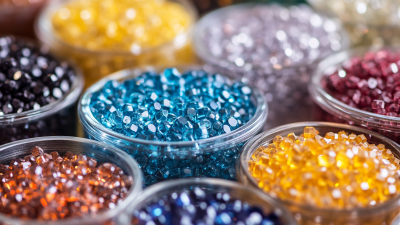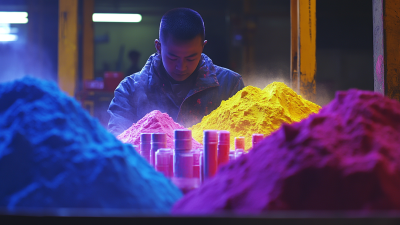In recent years, the industrial landscape has increasingly recognized the limitations of traditional materials, such as Glass Bead, in various applications. According to a report by MarketsandMarkets, the global alternative materials market is projected to reach $1 trillion by 2025, reflecting a growing demand for innovative solutions that enhance performance and sustainability. Glass Bead, while widely used for purposes such as surface preparation and reflective materials, often falls short in delivering optimal durability and versatility under challenging conditions. As industries strive for improved efficiency and product efficacy, exploring alternative solutions that not only mitigate the potential drawbacks of Glass Bead but also enhance operational capabilities is crucial. This guide delves into viable alternatives, their applications, and the beneficial outcomes they offer, empowering businesses to make informed decisions in their material choices.

As industries continue to evolve, the need for effective alternatives to glass bead solutions has become increasingly apparent. Traditional glass beads have long been favored for applications such as surface preparation and finishing; however, recent studies indicate that materials such as aluminum oxide and ceramic abrasives could provide superior performance. According to the "Abrasive Materials Market Report 2023," aluminum oxide grits exhibit a 20% longer lifespan compared to glass beads, making them a more cost-effective choice for companies focused on operational efficiency.
In addition to performance benefits, safety considerations are also driving the shift towards alternative materials. The Occupational Safety and Health Administration (OSHA) has reported a rise in workplace injuries related to glass bead exposure, prompting industries to seek safer options. Non-toxic abrasives like walnut shell and corn cob media are gaining traction as sustainable alternatives that not only reduce risk but also align with environmental objectives. Data from the "Sustainable Abrasives Survey" highlights that 65% of companies are actively integrating eco-friendly materials into their production processes, reshaping industry standards towards greener practices.
The shift towards synthetic materials in industrial applications is transforming numerous sectors. Unlike traditional glass bead solutions, synthetic materials offer greater durability, flexibility, and cost-effectiveness. According to a report by the American Society for Testing and Materials (ASTM), synthetic alternatives show up to 40% longer lifespan than glass beads, reducing the frequency of material replacement and maintenance costs. This longevity not only enhances operational efficiency but also minimizes waste, contributing to more sustainable practices.

When considering alternatives, it's essential to evaluate the specific requirements of your application. Synthetic materials can provide customized solutions, like varying hardness or resistance to chemicals, catering to diverse needs. For instance, using nylon beads in abrasive applications can yield superior results due to their lower breakage rates.
Tips for selecting synthetic materials include assessing the environmental impact, comparing cost-effectiveness, and understanding the properties specific to your application. Always consult with manufacturers who specialize in synthetic solutions to ensure you are making an informed decision. Over the next few years, the industry is projected to see a 25% increase in the adoption of synthetic materials, demonstrating a clear trend towards innovation and efficiency.
The exploration of eco-friendly alternatives to traditional glass bead solutions has gained significant traction, especially in industries focused on environmental sustainability. A notable contender is the use of biosorption techniques utilizing natural materials, such as alginate beads derived from Padina pavonica. Recent studies have demonstrated that these alginate beads can effectively bind and remove toxic pollutants like crystal violet dye from aqueous solutions, showcasing their potential as a sustainable option in wastewater treatment applications. This shift towards natural adsorbents highlights the industry's emphasis on utilizing biodegradable and non-toxic materials, as dyes are recognized as hazardous to aquatic life and can pose serious health risks.
In contrast, the behavior of silica nanoparticles in glass-bead columns remains underexplored. Research indicates that their transport and retention are significantly influenced by factors like particle size and the concentration of ionic species in the solution. This complexity necessitates a deeper understanding to optimize absorption processes, potentially leading to improved methodologies for dye removal and industrial applications. Moreover, innovative materials such as geopolymers have emerged as promising alternatives, which can notably reduce reliance on non-degradable polymers in wastewater management, further supporting the industry’s shift toward more eco-friendly solutions. These advancements signify a pivotal moment for industries to embrace sustainable practices and mitigate the environmental impact of their operations.
In recent years, the industry has witnessed a significant shift towards innovative technologies in surface treatments, moving beyond conventional glass bead solutions. While glass beads have long been a go-to option for various applications due to their cost-effectiveness and durability, the emergence of alternative materials is revolutionizing how surfaces are treated. These alternatives not only enhance performance but also address environmental concerns associated with traditional methods.
Among the leading innovations are engineered polymers and advanced ceramics, which offer superior abrasion resistance and reduced weight compared to glass beads. These materials are particularly advantageous in industries demanding high-performance standards, such as aerospace and automotive sectors. Additionally, technologies like laser treatment and plasma spraying are gaining traction, allowing for precise control over surface characteristics and enhancing adhesion properties. As companies continue to explore these alternatives, they can achieve a higher level of quality and sustainability in their products, ultimately driving the industry towards more eco-friendly practices.
In recent years, industries have been exploring alternative materials to glass beads for various applications, realizing that these substitutes can offer enhanced performance and sustainability. For example, a leading automotive company replaced traditional glass bead blasting with walnut shell media in its surface preparation processes. This change not only provided superior surface finishes but also reduced the environmental impact, as walnut shells are biodegradable and less abrasive to materials.

Another case study highlights the successful use of ceramic beads in the aerospace sector. A major aircraft manufacturer adopted ceramic bead blasting to achieve a smoother finish on turbine components. This alternative proved to be more effective in removing imperfections while maintaining the integrity of the metal surface. As a result, the manufacturer noted improved efficiency in the assembly process, leading to better overall aircraft performance. These examples illustrate the benefits of diversifying beyond glass bead solutions, paving the way for innovative practices in various industries.






